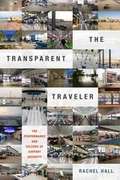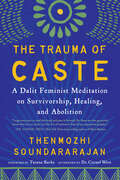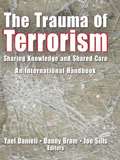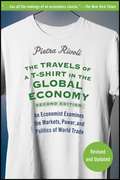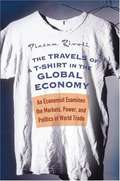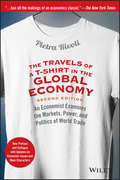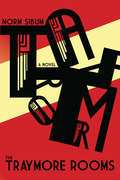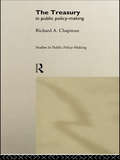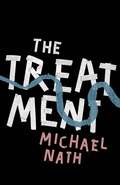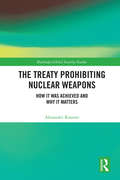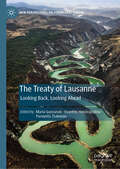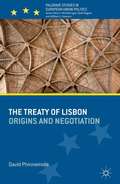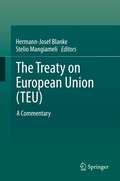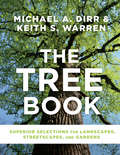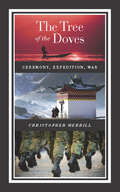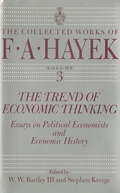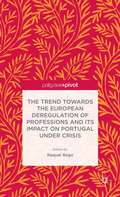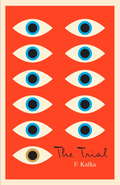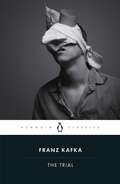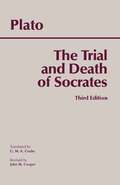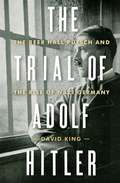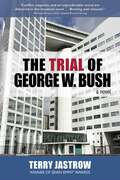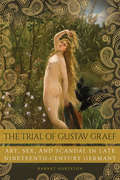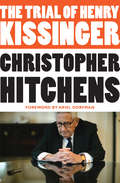- Table View
- List View
The Transparent Traveler: The Performance and Culture of Airport Security
by Rachel HallAt the airport we line up, remove our shoes, empty our pockets, and hold still for three seconds in the body scanner. Deemed safe, we put ourselves back together and are free to buy the beverage we were prohibited from taking through security. In The Transparent Traveler Rachel Hall explains how the familiar routines of airport security choreograph passenger behavior to create submissive and docile travelers. The cultural performance of contemporary security practices mobilizes what Hall calls the "aesthetics of transparency." To appear transparent, a passenger must perform innocence and display a willingness to open their body to routine inspection and analysis. Those who cannot--whether because of race, immigration and citizenship status, disability, age, or religion--are deemed opaque, presumed to be a threat, and subject to search and detention. Analyzing everything from airport architecture, photography, and computer-generated imagery to full-body scanners and TSA behavior detection techniques, Hall theorizes the transparent traveler as the embodiment of a cultural ideal of submission to surveillance.
The Trauma of Caste: A Dalit Feminist Meditation on Survivorship, Healing, and Abolition
by Thenmozhi SoundararajanInstant Amazon Best Seller and Hot New ReleaseFor readers of Caste and Radical Dharma, an urgent call to action to end caste apartheid, grounded in Dalit feminist abolition and engaged Buddhism.&“Dalit&” is the name that we chose for ourselves when Brahminism declared us &“untouchable.&” Dalit means broken. Broken by suffering. Broken by caste: the world&’s oldest, longest-running dominator system...yet although &“Dalit&” means broken, it also means resilient. Caste—one of the oldest systems of exclusion in the world—is thriving. Despite the ban on Untouchability 70 years ago, caste impacts 1.9 billion people in the world. Every 15 minutes, a crime is perpetrated against a Dalit person. The average age of death for Dalit women is just 39. And the wreckages of caste are replicated here in the U.S., too—erupting online with rape and death threats, showing up at work, and forcing countless Dalits to live in fear of being outed. Dalit American activist Thenmozhi Soundararajan puts forth a call to awaken and act, not just for readers in South Asia, but all around the world. She ties Dalit oppression to fights for liberation among Black, Indigenous, Latinx, femme, and Queer communities, examining caste from a feminist, abolitionist, and Dalit Buddhist perspective--and laying bare the grief, trauma, rage, and stolen futures enacted by Brahminical social structures on the caste-oppressed. Soundararajan&’s work includes embodiment exercises, reflections, and meditations to help readers explore their own relationship to caste and marginalization—and to step into their power as healing activists and changemakers. She offers skills for cultivating wellness within dynamics of false separation, sharing how both oppressor and oppressed can heal the wounds of caste and transform collective suffering. Incisive and urgent, The Trauma of Caste is an activating beacon of healing and liberation, written by one of the world&’s most needed voices in the fight to end caste apartheid.
The Trauma of Terrorism: Sharing Knowledge and Shared Care, An International Handbook
by Yael DanieliLearn intervention strategies to counter the effects of terrorismIn the twenty-first century, terrorism has become an international scourge whose effect devastates individuals, weakens societies, and cripples nations. The Trauma of Terrorism: Sharing Knowledge and Shared Care, An International Handbook and Shared Care provides a compreh
The Travels of a T-Shirt in the Global Economy
by Pietra RivoliThe Travels of a T-Shirt in the Global Economy has been lauded by the New York Times, Financial Times, and reviewers worldwide. Translated into fourteen languages, Travels has received numerous awards for its frank and nuanced discussion of global economic realities. Now updated and revised--including a discussion of environmental issues--this fascinating book illustrates crucial lessons in economics, politics, and globalization.The major themes and conclusions from the first edition are intact, but in response to questions from readers and students around the world, the second edition now includes:Updates on the people, businesses, and politics involved in the production of the T-shirt.Discussions of environmental issues related to both international trade and the T-shirt's life story.
The Travels of a T-Shirt in the Global Economy: An Economist Examines the Markets, Power and Politics of World Trade
by Pietra RivoliRivoli (international business, Georgetown U.) starts in Texas, researching the cotton plantations and the history of American cotton, then travels with the cotton to China, watching the work go on at bottom dollar, then traces cotton's troubles at the border in terms of trade policy and the implications of the 2005 ending of protectionism. Finally, he follows the path of used cotton clothing from the U.S. to developing nations. Annotation ©2006 Book News, Inc., Portland, OR (booknews.com)
The Travels of a T-Shirt in the Global Economy: An Economist Examines the Markets, Power, and Politics of World Trade. New Preface and Epilogue with Updates on Economic Issues and Main Characters
by Pietra RivoliThe keys to global business success, as taught by a T-shirt's journey The Travels of a T-Shirt in the Global Economy is a critically-acclaimed narrative that illuminates the globalization debates and reveals the key factors to success in global business. Tracing a T-shirt's life story from a Texas cotton field to a Chinese factory and back to a U.S. storefront before arriving at the used clothing market in Africa, the book uncovers the political and economic forces at work in the global economy. Along the way, this fascinating exploration addresses a wealth of compelling questions about politics, trade, economics, ethics, and the impact of history on today's business landscape. This new printing of the second edition includes a revised preface and a new epilogue with updates through 2014 on the people, industries, and policies related to the T-shirt's life story. Using a simple, everyday T-shirt as a lens through which to explore the business, economic, moral, and political complexities of globalization in a historical context, Travels encapsulates a number of complex issues into a single identifiable object that will strike a chord with readers as they: Investigate the sources of sustained competitive advantage in different industries Examine the global economic and political forces that explain trade patters between countries Analyze complex moral issues related to globalization and international business Discover the importance of cultural and human elements in international trade This story of a simple product illuminates the many complex issues which businesspeople, policymakers, and global citizens are touched by every day.
The Traymore Rooms
by Norm SibumA MILLIONS.COM MOST ANTICIPATED BOOK OF 2013A HYPOALLERGIC FALL LITERARY RELEASE TO KNOW ABOUT"Norm Sibum is not everyone's cup of tea ... instead of breathing air he inhales the exhaust of apocalyptic times."-Books in CanadaA place: the Traymore Rooms, downtown Montreal, an old walk-up. Those who live there and drink at the nearby café form the heart of Traymorean society. Their number includes: Eggy, red-faced, West Virginian, a veteran of Korea; Eleanor R (not Eleanor Roosevelt); Dubois, French Canadian, optimist; Moonface, waitress-cum-Latin-scholar and sexpot inexpert; and, most recently, our hero Calhoun. A draft dodger and poetical type.For a time all is life-as-usual: Calhoun argues with Eggy and Dubois, eats Eleanor's cobblers, gossips of Moonface, muses on Virgil and the current President. With the arrival of a newcomer to Traymore, however, Calhoun's thoughts grow fixated and dark. He comes to believe in the reality of evil. This woman breaks no laws and she inflicts no physical harm-yet for the citizens of Traymore, ex-pats and philosophers all, her presence becomes a vortex that draws them closer to the America they dread.Intelligent and frighteningly absurd, with a voice as nimble as Gass's and satire that pierces like Wallace's, The Traymore Roomsis a sustained howl against libertarianism under George W. Bush.Norm Sibum has been writing and publishing poetry for over thirty years. Born in Oberammergau in 1947, he grew up in Germany, Alaska, Utah, and Washington before moving to Vancouver in 1968. The Traymore Rooms is his first novel.
The Treasury in Public Policy-Making (Studies In Public Policy Making Ser.)
by Prof Richard ChapmanAnalyses the Treasury's role in public policy making and makes an original contribution to knowledge about the current work of the Treasury.The book focuses on three main areas:* the development of the Treasury from earliest times to the present* the current structure and organization of the Treasury following the radical changes which took place i
The Treatment
by Michael Nath'Simply the best British novel I've read this century' David Peace'Will stay in my head forever...a fantastic book' The Tablet'A maverick project that defies comparison' MetroAn ArtsDesk Best Book of 2020At a bus stop in south London, black teenager Eldine Matthews is murdered by a racist gang. Twenty years later, L Troop's top boys - models of vice, deviance and violence - are far beyond justice. There are some people the law will not touch.But Eldine's murder is not forgotten. His story is once again on everyone's lips and the streets of south London; a story of police corruption and the elimination of witnesses. A solicitor, a rent boy, a one-eyed comedian and his minder are raising ghosts; and Carl Hyatt, disgraced reporter, thinks he knows why.There's one man linking this crew of rambunctious dandies and enchanting thugs, and it's the man Carl promised never to challenge again: Mulhall, kingpin of London's rotten heart and defender of L Troop's racist killers. Carl must face up to the morality of retribution and the reality of violence knowing that he is the weak link in the chain; and that he has placed everyone he loves within Mulhall's reach.The Treatment is steeped in London's criminal past, its shadows of corruption and institutional racism. Like a seventeenth-century revenge tragedy, its characters reel from the streets, bars and brothels, hyperarticulate and propelled by wild justice.
The Treatment
by Michael Nath'Simply the best British novel I've read this century' David Peace'Will stay in my head forever...a fantastic book' The Tablet'A maverick project that defies comparison' MetroAn ArtsDesk Best Book of 2020At a bus stop in south London, black teenager Eldine Matthews is murdered by a racist gang. Twenty years later, L Troop's top boys - models of vice, deviance and violence - are far beyond justice. There are some people the law will not touch.But Eldine's murder is not forgotten. His story is once again on everyone's lips and the streets of south London; a story of police corruption and the elimination of witnesses. A solicitor, a rent boy, a one-eyed comedian and his minder are raising ghosts; and Carl Hyatt, disgraced reporter, thinks he knows why.There's one man linking this crew of rambunctious dandies and enchanting thugs, and it's the man Carl promised never to challenge again: Mulhall, kingpin of London's rotten heart and defender of L Troop's racist killers. Carl must face up to the morality of retribution and the reality of violence knowing that he is the weak link in the chain; and that he has placed everyone he loves within Mulhall's reach.The Treatment is steeped in London's criminal past, its shadows of corruption and institutional racism. Like a seventeenth-century revenge tragedy, its characters reel from the streets, bars and brothels, hyperarticulate and propelled by wild justice.
The Treaty Prohibiting Nuclear Weapons: How it was Achieved and Why it Matters (Routledge Global Security Studies)
by Alexander KmenttThis book chronicles the genesis of the negotiations that led to the Treaty on the Prohibition of Nuclear Weapons (TPNW), which challenged the established nuclear order. The work provides readers with an authoritative account of the complex evolution of the ‘Humanitarian Initiative’ (HI) and the negotiation history of the TPNW. It includes a close analysis of internal strategy documents and communications in the author’s possession which trace the tactical and political decisions of a small group of state actors. By demonstrating the unacceptable humanitarian consequences and uncontrollable risks that these weapons pose to everyone’s security, the HI convinced many states to ban nuclear weapons and reject the policy of nuclear deterrence as unsustainable and illegitimate. As such, this book is a case-study of multilateral diplomacy and cooperation between state and civil society actors. It also contains a full discussion of both sides of the nuclear argument and assesses the extent to which the HI and the TPNW have moved the dial and present opportunities for transformational change. This book will be of much interest to students of nuclear disarmament, arms control and non-proliferation, diplomacy, global governance, and International Relations in general.
The Treaty of Lausanne: Looking Back, Looking Ahead (New Perspectives on South-East Europe)
by Evanthis Hatzivassiliou Maria Gavouneli Panayotis TsakonasThis book explores the creation and legacy of the Treaty of Lausanne, which marked the end of the First World War in the Near East, as well as the end of the old Eastern Question. It deals with the role, political and legal, of the Treaty in the international system, its effects on the national policies of the Great Powers and of regional States, the impact of economic issues and oil diplomacy, along with its social repercussions in the compulsory exchange of Greek and Turkish populations. The book brings together historians, political scientists, experts on international relations, and scholars of international law to cast new light on the shaping of the contemporary Eastern Mediterranean and the Middle East, and the interaction between the regional and the global. It is valuable resource for academics and practitioners focused on all these areas of study.
The Treaty of Lisbon
by David PhinnemoreDetailed and comprehensive analysis of how the Treaty of Lisbon emerged in 2007 this book explores the role played by the German Council Presidency and the EU's institutional actors in securing agreement among the leaders of member states on an intergovernmental conference as well as a new treaty text to replace the rejected Constitutional Treaty.
The Treaty on European Union (TEU)
by Stelio Mangiameli Hermann-Josef BlankeThe major Commentary on the Treaty on European Union (TEU) is a European project that aims to contribute to the development of ever closer conceptual and dogmatic standpoints with regard to the creation of a "Europeanised research on Union law". This publication in English contains detailed explanations, article by article, on all the provisions of the TEU as well as on several Protocols and Declarations, including the Protocols No 1, 2 and 30 and Declaration No 17, having steady regard to the application of Union law in the national legal orders and its interpretation by the Court of Justice of the EU. The authors of the Commentary are academics from ten European states and different legal fields, some from a constitutional law background, others experts in the field of international law and EU law professionals. This should lead to more unity in European law notwithstanding all the legitimate diversity. The different traditions of constitutional law are reflected and mentioned by name thus striving for a common framework for European constitutional law.
The Tree Book: Superior Selections for Landscapes, Streetscapes, and Gardens
by Michael A. Dirr Keith S. Warren“A boon to all those who plant, care for, and love trees.”—Nina Bassuk, author of Trees in the Urban Landscape The Tree Book is the go-to reference to more than 2,400 species and cultivars, from two of the biggest names in horticulture—Michael A. Dirr and Keith S. Warren. The featured trees include those widely available in the nursery trade, some new and promising choices, and a selection of overlooked options that deserve renewed interest. Each tree profile includes the common and botanical names along with details on foliage; flowers, seeds, fruits, and cones; native range; adaptability; and popular uses in landscapes. The Tree Book is a must-have resource for landscapes architects, city foresters, horticulturists, and enthusiastic home gardeners.
The Tree of the Doves: Ceremony, Expedition, War
by Christopher Merrill“A unique travelogue” that “explores the nature of terror, its place in the post-9/11 world and how it unites and galvanizes those in the throes of it” (Kirkus Reviews).Using several ageless questions—“Where do we come from? Where are we going? What shall we do?”—as his point of departure, journalist and award-winning poet Christopher Merrill explores the related issues of terror, modernity, tradition, and epochal transformation. In three extended essays, Merrill observes the performance of a banned ritual in the Malaysian province of Kelatan; traces Saint-John Perse’s epic voyage from Beijing to Ulan Bator in 1921 and relates it to the China of today; and embarks on a trip across the Levant in 2007 in the wake of the American wars in Iraq and Afghanistan.Merrill asserts that it is in this trinity of human actions—ceremony, expedition, war: all devised to keep terror at bay—that history is formed, and that the technological, political, environmental, and social changes we are witnessing now presage the end of one order and the creation of another.“Merrill is a ‘writer’s writer’: he spins sentences made of gold.” —Publishers Weekly
The Trend of Economic Thinking: Essays on Political Economists and Economic History (The Collected Works of F. A. Hayek #3)
by F. A. Hayek“[A] history of economics from the times of Adam Smith, to [Hayek’s] own contemporary times where capitalism and communism were at each other’s throats.” —Midwest Book ReviewThe Iron Curtain has been cast aside. The Berlin Wall has fallen. Germany has been reunited. And F. A. Hayek’s forceful predictions of the inevitable failure of socialism and central economic planning are now rendered irrefutable. Yet Hayek still rightfully cautions us to heed his arguments, warning that “in economics you can never establish a truth once and for all but have always to convince every generation anew.”The Trend of Economic Thinking captures Hayek’s views on political economists and economic history—on Mandeville, Hume, Cantillon, Adam Smith, and Henry Thornton. Framed by insightful editorial notes, fifteen newly collected essays—including five previously unpublished pieces and two others never before available in English—provide a fascinating introduction to the historical context of political economy and the evolution of monetary practices. In a highlight of the collection, “On Being an Economist,” Hayek reflects on the influence of economists, the time required for new ideas to take hold, the best way to educate economic theorists, and the need to follow one’s own interests, often in opposition to fashionable beliefs. As always, the words of this outspoken scholar are sure to provoke debate.“Hayek, awarded the Nobel Memorial Prize in Economic Sciences in 1974, was a pioneer in monetary theory and one of the principal proponents of the libertarian philosophy . . . The essays, supplemented by editorial notes, provide an introduction to the historical context of political economy in Britain and the evolution of monetary practices.” —Reference & Research Book News
The Trend towards the European Deregulation of Professions and Its Impact on Portugal under Crisis
by Raquel RegoFor the first time, European professional deregulation is the focus of reflection by social scientists. This book explores how professional associations act as pressure groups and highlights the democratic regime that is prevailing and the potential convergence problems that Europe may face.
The Trial
by Franz KafkaWritten in 1914, The Trial is one of the most important novels of the twentieth century: the terrifying tale of Josef K., a respectable bank officer who is suddenly and inexplicably arrested and must defend himself against a charge about which he can get no information. Whether read as an existential tale, a parable, or a prophecy of the excesses of modern bureaucracy wedded to the madness of totalitarianism, Kafka's nightmare has resonated with chilling truth for generations of readers. This new edition is based upon the work of an international team of experts who have restored the text, the sequence of chapters, and their division to create a version that is as close as possible to the way the author left it.In his brilliant translation, Breon Mitchell masterfully reproduces the distinctive poetics of Kafka's prose, revealing a novel that is as full of energy and power as it was when it was first written.
The Trial (Penguin Modern Classics)
by Franz KafkaKafka's gripping work of psychological horror, with a new introduction and notes by Carolin DuttlingerA terrifying psychological trip into the life of one Joseph K., an ordinary man who wakes up one day to find himself accused of a crime he did not commit, a crime whose nature is never revealed to him. Once arrested, he is released, but must report to court on a regular basis--an event that proves maddening, as nothing is ever resolved. As he grows more uncertain of his fate, his personal life--including work at a bank and his relations with his landlady and a young woman who lives next door--becomes increasingly unpredictable. As K. tries to gain control, he succeeds only in accelerating his own excruciating downward spiral.
The Trial and Death of Socrates, 3rd edition: Euthyphro, Apology, Crito, death scene from Phaedo (Hackett Classics)
by Plato G. M. A. Grube John M. CooperThe third edition of The Trial and Death of Socrates presents G. M. A. Grube's distinguished translations, as revised by John Cooper for Plato, Complete Works. A number of new or expanded footnotes are also included along with a Select Bibliography.
The Trial of Adolf Hitler: The Beer Hall Putsch and the Rise of Nazi Germany
by David KingOn the evening of November 8, 1923, the thirty-four-year-old Adolf Hitler stormed into a beer hall in Munich, fired his pistol in the air, and proclaimed a revolution. Seventeen hours later, all that remained of his bold move was a trail of destruction. Hitler was on the run from the police. His career seemed to be over. The Trial of Adolf Hitler tells the true story of the monumental criminal proceeding that followed when Hitler and nine other suspects were charged with high treason. Reporters from as far away as Argentina and Australia flocked to Munich for the sensational four-week spectacle. By its end, Hitler would transform the fiasco of the beer hall putsch into a stunning victory for the fledgling Nazi Party. It was this trial that thrust Hitler into the limelight, provided him with an unprecedented stage for his demagoguery, and set him on his improbable path to power. Based on trial transcripts, police files, and many other new sources, including some five hundred documents recently discovered from the Landsberg Prison record office, The Trial of Adolf Hitler is a gripping true story of crime and punishment--and a haunting failure of justice with catastrophic consequences.
The Trial of George W. Bush: A Novel
by Terry JastrowTHE MOST CONTROVERSIAL POLITICAL NOVEL IN AMERICAFollowing the worst terrorist attacks in American history on September 11, 2001, President George W. Bush pledged to bring those responsible to justice, especially the mastermind behind it all, Osama bin Laden. After failing to capture bin Laden in Afghanistan, George W. Bush shifted his attention and that of our country to Saddam Hussein and Iraq, neither of which had anything to do with the 9/11 attacks (as history has proven). Bush, Jr., wanted a war in Iraq, and with the help of others in his administration, he succeeded in waging one regardless of its price in human lives or expense to his country's treasury. George W. Bush&’s Iraq War lasted eight and a half years, killed tens of thousands of people, and cost the United States trillions of dollars.In Terry Jastrow&’s new novel, The Trial of George W. Bush, past evil deeds are exposed and reckoned with in a most unexpected way. At a time when America&’s political leadership has alienated itself from the rest of the world, the scales of justice respond in a trial at the International Criminal Court in which former President George W. Bush is accused of war crimes and crimes against humanity. This fascinating trial brings together eyewitness testimony from a former Secretary of State, the Commander of US Central Command who oversaw military operations, an American counterterrorism expert, and a female Iraqi blogger, who reads from the blogs she wrote while Bush&’s war was destroying her country.As the trial ends after weeks of contentious statements and nonstop coverage by an overzealous media, a captivated worldwide public awaits the determination of Bush&’s fate. Will he be found guilty or not? The surprising verdict is revealed in Terry Jastrow&’s new novel, The Trial of George W. Bush.
The Trial of Gustav Graef: Art, Sex, and Scandal in Late Nineteenth-Century Germany
by Barnet HartstonAlthough largely forgotten now, the 1885 trial of German artist Gustav Graef was a seminal event for those who observed it. Graef, a celebrated sixty-four-year-old portraitist, was accused of perjury and sexual impropriety with underage models. On trial alongside him was one of his former models, the twenty-one-year-old Bertha Rother, who quickly became a central figure in the affair. As the case was being heard, images of Rother, including photographic reproductions of Graef's nude paintings of her, began to flood the art shops and bookstores of Berlin and spread across Europe. Spurred by this trade in images and by sensational coverage in the press, this former prostitute was transformed into an international sex symbol and a target of both public lust and scorn. Passionate discussions of the case echoed in the press for months, and the episode lasted in public memory for far longer. The Graef trial, however, was much more than a salacious story that served as public entertainment. The case inspired fierce political debates long after a verdict was delivered, including disputes about obscenity laws, the moral degeneracy of modern art and artists, the alleged pernicious effects of Jewish influence, legal restrictions on prostitution, the causes of urban criminality, the impact of sensationalized press coverage, and the requirements of bourgeois masculine honor. Above all, the case unleashed withering public criticism of a criminal justice system that many Germans agreed had become entirely dysfunctional. The story of the Graef trial offers a unique perspective on a German Empire that was at the height of its power, yet riven with deep political, social, and cultural divisions. This compelling study will appeal to historians and students of modern German and European history, as well as those interested in obscenity law and class and gender relations in nineteenth-century Europe.
The Trial of Henry Kissinger
by Christopher HitchensIn The Trial of Henry Kissinger, Christopher Hitchens shifts focus from Pinochet, Milosevic, Hussein, and Kim Jong-il to a man seemingly lauded and revered by the American people for what are undeniably war crimes: Henry Kissinger. Now available as a Signal paperback. Forget the regular cadre of war criminals that pollute our news headlines day in and day out; we need look no further than America's own celebrated leaders for a war criminal whose offenses rival those of the most heinous dictators in recent history: Henry Kissinger. Employing evidence based on firsthand testimony, unpublished documents, and new material uncovered by the Freedom of Information Act, and using only what would hold up in international courts of law, The Trial of Henry Kissinger outlines worldwide atrocities authorized by the former secretary of state -- among them "conspiracy to commit murder, kidnap, and torture." With the precision and tenacity reminiscent of a prosecutor presenting his case, Hitchens offers readers an unrepentant, honest portrait of Kissinger, and implores governments around the world, including our own, to swiftly bring him to justice.
